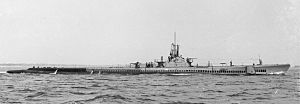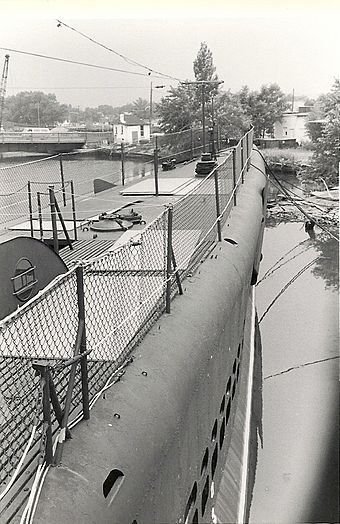USS Ling facts for kids

USS Ling (SS-297), wearing camouflage paint scheme in July 1945, during sea trials.
|
|
| History | |
|---|---|
| Namesake | Ling, Fish |
| Builder |
|
| Yard number | 552 |
| Laid down | 2 November 1942 |
| Launched | 15 August 1943 |
| Commissioned | 8 June 1945 |
| Decommissioned | 26 October 1946 |
| Stricken | 1 December 1971 |
| Honours and awards |
1 Battle Star |
| Status | Former Museum Ship, at former location of the New Jersey Naval Museum in Hackensack, New Jersey |
| General characteristics | |
| Class and type | Balao-class diesel-electric submarine |
| Displacement | |
| Length | 311 ft 8 in (95.00 m) |
| Beam | 27 ft 3 in (8.31 m) |
| Draft | 16 ft 10 in (5.13 m) maximum |
| Propulsion |
|
| Speed |
|
| Range | 11,000 nm (20,000 km) surfaced at 10 knots (19 km/h) |
| Endurance |
|
| Test depth | 400 ft (120 m) |
| Complement | 10 officers, 70–71 enlisted |
| Armament |
|
|
U.S.S. LING
|
|
 |
|
| Location | Hackensack River at 150 River Street, Hackensack, New Jersey |
| Area | less than one acre |
| Built | 1945 |
| Architect | Cramp, William & Sons |
| Architectural style | BALAO Class |
| NRHP reference No. | 78001736 |
| Significant dates | |
| Added to NRHP | 19 October 1978 |
The USS Ling (SS-297) is a special type of submarine called a Balao-class submarine. It was built for the United States Navy during World War II. The submarine is named after a fish called the ling, also known as the cobia.
The Ling was finished in the last months of the war. Because of this, it did not take part in any battles. It was put into storage in 1946. Later, in 1960, it became a training ship. In 1971, it was removed from the Navy's official list of ships. It was then given to the Submarine Memorial Association to become a museum ship. The Ling is currently located in the Hackensack River in Hackensack, New Jersey. It has been closed to visitors since 2016.
Contents
Building and Early Service of the USS Ling
The Ling started being built on November 2, 1942. This happened at the Cramp Shipbuilding Company in Philadelphia. It was launched into the water on August 15, 1943. Mrs. E. J. Foy was its sponsor, which is like a godmother for a ship.
The submarine then moved to the Boston Navy Yard to be finished and tested. The Ling was officially put into service on June 8, 1945. It took a long time to build this submarine, over three and a half years. This was much longer than most World War II submarines.
Testing and Decommissioning
After its first tests, called a shakedown cruise, the Ling went to sea on September 15, 1945. This was just 13 days after Japan had surrendered, ending World War II. The submarine was based in Naval Submarine Base New London in Connecticut.
In February 1946, it sailed to the Panama Canal Zone. It worked there for a short time. On October 26, 1946, the Ling was taken out of service. It had only been active for about one year and four months. It then joined the Atlantic Reserve Fleet, meaning it was kept ready but not actively used.
Becoming a Training Ship
In March 1960, the Ling was moved to Brooklyn, New York. There, it was changed into a training ship at the Brooklyn Navy Yard. It was used to teach sailors how submarines work. In 1962, its official classification changed to Auxiliary Submarine (AGSS-297).
The Ling received two awards for its service: the American Campaign Medal and the World War II Victory Medal. On December 1, 1971, it was removed from the Navy's list of ships for good.
The USS Ling as a Museum Ship
Six months after leaving the Navy, the USS Ling was given to the Submarine Memorial Association. This group was formed in 1972 to save the Ling from being scrapped. They wanted to bring the submarine to Hackensack, New Jersey. It would serve as a memorial for sailors who died serving their country.
Many people and companies helped restore the Ling. They gave time, skills, and money. In January 1973, the submarine arrived at its current home in New Jersey. It was cleaned, painted, and fixed up for public tours. The inside parts were made to look like a real World War II submarine. The Ling became the main attraction of the New Jersey Naval Museum.
Unlocking the Safes
In 2006, X-rays showed that the submarine had five safes. These safes contained documents and metal objects. However, no one knew the combinations to open them. On January 27, 2006, a famous locksmith named Jeff Sitar opened the safes. He used only his fingers and a special sound device, not drills or explosives.
Inside the safes, they found many interesting things. These included pennies, bullets, keys, and old training manuals. They also found two cans of strong alcohol from the 1900s.
Movie Appearance
In 2010, the Ling was used in a movie called Katya. It was filmed in Russian and made in America. The Ling pretended to be a Soviet submarine K-129. That real Soviet submarine sank in 1968.
The Ling's Current Location
From 1972, the New Jersey Naval Museum paid one dollar a year to rent the land for the Ling. In 2007, the land owner said they would sell the site. This meant the museum and submarine would need to move.
The museum itself closed in 2013 because of damage from Hurricane Sandy. It closed again in 2015 for more repairs. The museum was expected to leave the property in August 2018. Since then, the Ling has remained at its location, but it is not open to the public.
Why the Ling Cannot Move
The Ling is currently stuck in the Hackensack River. The river's water flow has been greatly reduced. This is because water is taken for drinking from the Oradell Dam. The river channel is now too shallow for the submarine to move.
There are no plans or money to dig out the riverbed. The mud in the river also contains industrial toxins. This makes dredging even more difficult.
There are also four bridges south of the Ling that do not open. Two are for cars and two are for trains. These bridges make it impossible to move the submarine down the river.
See also
 | William Lucy |
 | Charles Hayes |
 | Cleveland Robinson |




